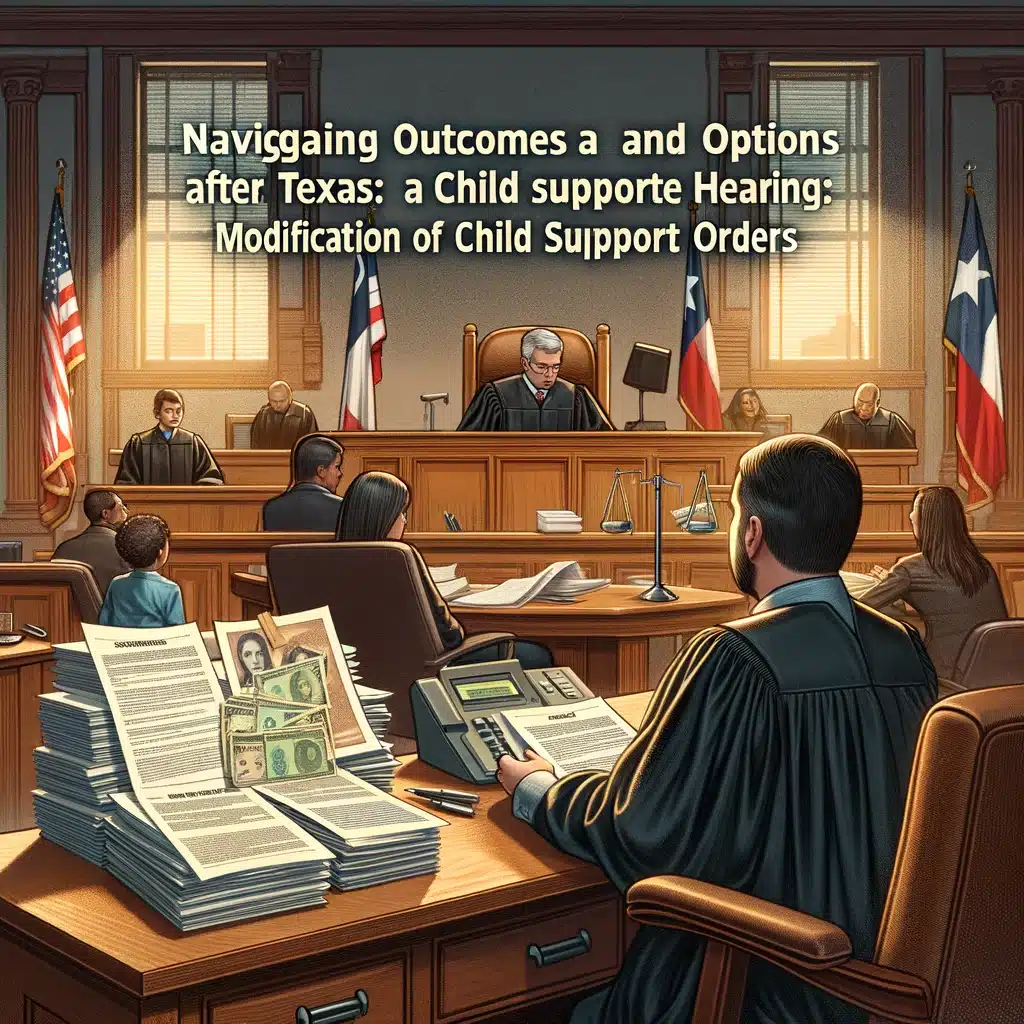As you enjoy your morning coffee and peruse your inbox, an email from your ex regarding missed child support payments grabs your attention. It’s a familiar scenario, leaving you pondering, “What happens at a child support enforcement hearing in Texas?” Rest assured, you’re not alone; grappling with the intricacies of child support can evoke a myriad of emotions, legal jargon, and unexpected twists and turns.

Today, we’re here to shed light on the intricacies of child support enforcement hearings in Texas. Curious about what transpires in those courtrooms? Interested in how a judge makes decisions regarding child support issues? Don your metaphorical detective hat, as we’re poised to unveil the mysteries of these hearings!
Short Answer: At a child support enforcement hearing in Texas, the court examines whether a parent has breached a child support agreement. This process involves presenting evidence, arguing cases, and can result in penalties for the parent who has failed to comply.
If you’re eager to delve deeper into this legal labyrinth and explore what could unfold, continue reading. We’ve compiled comprehensive insights into the entire procedure, from preparation to possible outcomes, and even tips on what steps to take if things don’t go as expected. Let’s get started!

Understanding Child Support Enforcement Hearings in Texas: A Guide to Family Law
Introduction to Family Law Cases
In the field of family law, there’s a wide range of cases that reflect the complexity of human relationships. A key area of focus is enforcement cases, particularly those involving child support, where understanding “What Expenses Are Covered By Child Support?” is essential. These cases are crucial for addressing violations of court orders, including in-depth analysis of proceedings like child support enforcement hearings in Texas. This exploration allows us to delve into the diverse aspects of family law, shedding light on important elements, guidelines, and strategies relevant to each unique case.
Child Custody Laws and Guidelines
Child custody battles are often fraught with emotional and legal complexities. Understanding the principles of visitation rights and prioritizing the child’s best interests are at the heart of these cases. Courts weigh numerous factors, including each parent’s capacity to provide stability, the child’s relationship with both parents, and any history of abuse or neglect. The overarching aim is to foster a supportive and safe environment for the child.
Legal Grounds for Enforcement Cases in Texas
Enforcement cases within family law are crucial for addressing breaches of court orders, including child support and alimony agreements. Consider a scenario where a parent fails to meet their child support obligations, imposing financial hardships on the custodial parent. This is where understanding “what happens at a child support enforcement hearing in Texas” becomes essential. These hearings play a pivotal role in maintaining the integrity of court decisions and ensuring compliance with legal obligations.
What Happens at a Child Support Enforcement Hearing in Texas: Mediation and Dispute Resolution Strategies
Mediation and Alternative Dispute Resolution in Texas
Before escalating to the intensity of courtroom proceedings, it’s worth exploring mediation and alternative dispute resolution methods. These approaches can be time-efficient, cost-effective, and less emotionally taxing. In family law, especially when asking “what happens at a child support enforcement hearing in Texas,” collaborative strategies allow parties to work together to find solutions. For example, in custody disputes, parents might agree on joint custody arrangements that serve the best interests of the child.

The Role of Legal Representation in Texas Family Law
The importance of engaging an experienced family law attorney is critical, particularly when navigating what happens at a child support enforcement hearing in Texas. These lawyers bring a wealth of knowledge in legal procedures, offering essential guidance and strong representation. Their expertise becomes especially crucial in emotionally charged cases like child custody, where professional support can make a significant difference.
Evidence Gathering for Child Support Hearings in Texas
Building a solid case in family law, including understanding what happens at a child support enforcement hearing in Texas, requires robust evidence. Whether it’s an enforcement case or another family law matter, thorough documentation is crucial. Keeping detailed records of interactions, financial transactions, and other relevant information is vital. A well-prepared collection of evidence can significantly enhance the effectiveness of your case in court.
|
Types of Evidence |
Importance |
|
Documentation of missed visitations |
Provides a clear record of violations |
|
Witness testimonies |
Adds credibility and firsthand accounts |
|
Financial records |
Supports claims of non-compliance with financial obligations |
|
Communication records |
Demonstrates attempts to resolve issues amicably |
|
Photographs or videos |
Visual evidence of violations or circumstances |
|
Expert opinions |
Professional insights on child welfare or financial matters |
|
Journals or logs |
Chronological account of events and denials |
|
School or medical records |
Establishes patterns of involvement and responsibilities |
|
Text messages or emails |
Digital correspondence reflecting discussions and agreements |
Legal Remedies in Child Support Enforcement Cases in Texas
Tailored Remedies in Enforcement Cases
Enforcement cases in Texas, especially those related to child support, encompass a range of solutions that go beyond punitive actions such as jail time. One key remedy includes the “Request for Issuance of Income Withholding for Support” to ensure compliance with child support obligations. These remedies are tailored to the specific violation involved. For example, if a parent repeatedly fails to adhere to visitation schedules, the court may respond by granting additional visitation rights to the other parent. This approach, particularly relevant in child support enforcement hearings in Texas, seeks to address the imbalance and prioritize the child’s best interests, with measures like income withholding playing a crucial role.

Upholding the Child’s Best Interest Standard
At the heart of family law, and especially relevant in understanding what happens at a child support enforcement hearing in Texas, is the principle of the child’s best interest. This standard is a guiding light for judges in making decisions about custody, visitation, and related matters. It places emphasis on the child’s stability, emotional well-being, and developmental needs, ensuring that these factors are at the forefront of any legal decision.
Modifying Court Orders in Texas Family Law
It’s important to recognize that court orders, including those related to child support, are adaptable in response to significant changes in circumstances. Modification cases are distinct from enforcement cases; they require showing that substantial changes have occurred that warrant revising the original order. For example, if a parent relocates, leading to a need for changes in custody arrangements, filing for a modification would be the appropriate course of action. This aspect is crucial for those involved in child support enforcement cases in Texas, as it highlights the dynamic nature of family law and the potential for adjustments as life evolves.
Understanding Child Support Enforcement Hearings in Texas: The Roles of Witnesses and Attorneys
Roles of Witnesses in Texas Child Support Enforcement Hearings
Witnesses hold a crucial position in family law cases, including in the context of “what happens at a child support enforcement hearing in Texas.” Their testimonies can profoundly influence the decisions of judges by shedding light on the dynamics between the involved parties. For example, in a child custody case within a child support enforcement hearing, a witness’s account of a parent’s active involvement in their child’s life can greatly affect the court’s evaluation of that parent’s capabilities.

Role of Attorneys During Child Support Enforcement Hearings in Texas
In child support enforcement hearings in Texas, family law attorneys play a vital role. They actively engage in presenting arguments, cross-examining witnesses, and tackling counterarguments. Their skill in expressing legal points and building persuasive narratives is critical in influencing the hearing’s outcome. This expertise is especially important in understanding what happens at a child support enforcement hearing in Texas, where legal nuances can significantly sway the case’s direction.
Legal Procedure and Due Process in Texas Family Law
Grasping the legal procedures and due process rights is essential in family law cases, particularly when considering what happens at a child support enforcement hearing in Texas. Familiarity with courtroom etiquette, serving notices correctly, and adhering to procedural deadlines are all integral components of ensuring a fair and equitable legal process. Each step in this procedure contributes to the overall integrity and justice of the legal system, especially in the sensitive arena of family law.
Understanding Child Support Enforcement Hearings in Texas: Emotional and Jurisdictional Considerations
Consideration of Emotions and Psychology in Texas Child Support Hearings
The emotional and psychological aspects are pivotal in family law, particularly in understanding what happens at a child support enforcement hearing in Texas. Emotions often play a significant role in decision-making and strategizing within these cases. Attorneys skilled in managing these emotional dynamics can guide their clients towards effective resolutions, all while acknowledging and addressing the emotional impact involved.

Enforcement Process in Different Jurisdictions and Its Impact on Texas Hearings
Family law procedures, including what happens at a child support enforcement hearing in Texas, can vary significantly across different jurisdictions. While the fundamental principles of family law are consistent, regional nuances in processes and legal precedents can influence outcomes. It’s vital for those involved in such cases to be aware of these jurisdictional differences, especially when dealing with enforcement issues in Texas.
Challenges of Enforcement in International Family Law
When child support enforcement hearings in Texas intersect with international family law, unique challenges emerge. Cross-border custody disputes introduce complex issues, such as navigating different legal systems and enforcing court orders across international borders. In these scenarios, expert legal guidance is crucial. Understanding what happens at a child support enforcement hearing in Texas in the context of international law requires specialized knowledge and experience to effectively navigate these multifaceted legal waters.
Navigating Post-Hearing Procedures and Enforcement in Texas Family Law
Appeals and Post-Hearing Options in Texas Family Law Cases
After the conclusion of a family law hearing, including a child support enforcement hearing in Texas, parties can appeal the court’s decision if they believe procedural errors occurred. Understanding post-hearing steps, such as adhering to court orders and seeking modifications, is essential. These steps are key to effectively enforcing and possibly adjusting the court’s ruling based on evolving circumstances or new evidence.

Child Support and Alimony Enforcement in Texas
A critical component of family law, especially in the context of what happens at a child support enforcement hearing in Texas, is the enforcement of financial obligations like child support and alimony. The courts play a pivotal role in ensuring that all parties fulfill their financial duties, which is crucial for the well-being of those involved, particularly children who are dependent on this support.
Addressing Parental Alienation and High-Conflict Situations in Texas
Cases characterized by parental alienation or high-conflict dynamics demand a sensitive and strategic approach. In Texas, these situations, especially in the aftermath of child support enforcement hearings, demand tactics that prioritize the mental and emotional health of the child. The objective is to cultivate and maintain healthy relationships between parents and children, despite the complexities and challenges that may arise in these high-stakes family law scenarios.
Navigating Child Support Enforcement Hearings in Texas: Self-Representation and Collaborative Law
Resources for Self-Representation in Texas Family Law
For those considering self-representation in family law cases, including understanding what happens at a child support enforcement hearing in Texas, numerous resources, guides, and tools are available. These materials offer valuable insights into legal processes and procedures, empowering individuals to navigate their cases with greater confidence and knowledge.

Collaborative Law and Co-Parenting Plans in Texas
In Texas family law, there is a growing emphasis on collaborative approaches, which prioritize cooperation and joint decision-making, particularly in child support enforcement hearings. Developing thorough co-parenting plans is crucial to ensure that children’s needs are met effectively following separation or divorce. This approach helps in creating a stable and nurturing environment for children, despite the changes in family dynamics.
Overview of Family Law in Texas
The landscape of family law in Texas is diverse, covering various aspects from custody disputes to financial obligations and addressing emotional challenges. Understanding the intricacies of family law is vital for protecting the interests and well-being of all involved. In Texas, where legal scenarios can be as broad as its horizons, effectively navigating family law requires strategic planning, empathy, and often the guidance of experienced legal professionals.
What Happens at a Child Support Enforcement Hearing in Texas
In the intricate world of Texas family law, child support enforcement hearings play a pivotal role in ensuring compliance with financial responsibilities critical to the well-being of children. This section will explore in detail what happens at a child support enforcement hearing in Texas. We aim to provide comprehensive insights into the legal proceedings and their impact on families, focusing on the unique aspects of the Lone Star State’s regulations and procedures in these crucial hearings.
Child Support Enforcement Hearings in Texas: Understanding the Basics
Overview of Child Support in Texas
To grasp what happens at a child support enforcement hearing in Texas, it’s crucial to first understand the general framework of child support in the state. Governed by both state and federal laws, the primary goal of these regulations is to ensure children receive necessary financial support from their parents, regardless of the parents’ relationship status.

Establishing Child Support Orders
In Texas, child support orders are typically set during divorce proceedings or in paternity cases. These legal documents detail the financial obligations of one parent (referred to as the obligor) towards the other parent (known as the obligee), aimed at covering various needs of the child.
Enforcement of Child Support Obligations
Enforcement actions become necessary when an obligor fails to fulfill their child support responsibilities in Texas. These actions range from wage garnishment and asset seizure to, in extreme cases, imprisonment. These measures aim to ensure compliance with child support orders and safeguard the child’s financial well-being. However, there are instances where obligors resort to tactics like “The Dirty Trick of Quitting Your Job to Avoid Child Support.” This involves the obligor deliberately leaving their job or reducing income to evade child support obligations.
With this understanding of child support enforcement in Texas, including challenges like the aforementioned tactic, we can explore in detail what transpires at a child support enforcement hearing. These hearings play a crucial role in upholding child support orders and ensuring their effective execution, even in the face of such evasive strategies.
Navigating the Child Support Enforcement Hearing Process in Texas
Preparing for a Child Support Enforcement Hearing in Texas
Understanding what happens at a child support enforcement hearing in Texas is crucial, and it highlights the importance of the approach “Child Support Enforcement Defense – Act Sooner Rather than Later.” The process initiates with the obligee filing a motion for enforcement in court. This motion outlines the alleged violations by the obligor, typically focusing on their failure to make the required child support payments. For both parties involved in this legal proceeding, early and thorough preparation is essential. By acting sooner rather than later, especially in terms of child support enforcement defense, parties can better prepare for the complexities of the hearing and ensure they effectively present their case.

Gathering Evidence for the Hearing in Texas
A critical component of what happens at a child support enforcement hearing in Texas is the gathering of evidence by both the obligee and the obligor. This evidence is essential to build a strong case and typically includes:
- Payment Records: It’s important for the obligor to keep meticulous records of all child support payments made, noting the dates, amounts, and methods of payment.
- Correspondence: All forms of communication between the parties concerning child support should be documented. This includes emails, text messages, and letters.
- Financial Records: Both parties are expected to present financial documentation, such as tax returns, pay stubs, and bank statements, during the hearing.
- Witness Testimonies: If relevant, witnesses who can provide insights into the obligor’s financial situation or explain the reasons behind missed payments should be identified and prepared to testify at the hearing.
Understanding these steps and preparing accordingly are key to navigating what happens at a child support enforcement hearing in Texas, ensuring that both parties are adequately prepared to present their case effectively.
Understanding What Happens at a Child Support Enforcement Hearing in Texas
Court Appearance in Texas Child Support Enforcement Hearings
A crucial aspect of what happens at a child support enforcement hearing in Texas is the court appearance. Both the obligee and the obligor, potentially accompanied by their attorneys, appear before a judge. Punctuality and appropriate dress are important, as they reflect the respect and professionalism required in court proceedings.

Presentation of Evidence at the Hearing
During the hearing, a key phase is the presentation of evidence. This is when both parties have the opportunity to present their arguments and supporting documents. The obligee typically shows evidence of missed or insufficient child support payments. Conversely, the obligor may present details of their financial situation or justify any non-compliance with the support order.
The Role of Legal Representation in Texas
Having legal representation, especially for the obligor, is highly recommended in these hearings. An experienced family law attorney can effectively navigate the complexities of the legal process. Their expertise ensures that the client’s rights are protected and that they can present a strong case.
Judge’s Decision in Child Support Enforcement Cases
After evaluating the evidence and hearing from both sides, the judge will make a decision. If the judge concludes that the obligor has violated the child support order, various enforcement measures may be issued. These can include wage garnishment, modification of the order, or other legal remedies to ensure compliance with the child support obligations. Understanding these potential outcomes is a crucial part of what happens at a child support enforcement hearing in Texas.
Exploring the Potential Outcomes of a Child Support Enforcement Hearing in Texas
Contempt of Court as an Outcome in Texas Child Support Hearings
A significant aspect of what happens at a child support enforcement hearing in Texas is the possibility of a contempt of court finding against the obligor. This finding indicates that the obligor has intentionally defied the court’s child support order. In such cases, the judge has the authority to impose various penalties, which can range from fines to, in more severe situations, jail time. This outcome serves as a stringent measure to enforce compliance with child support obligations and uphold the authority of the court.
|
Outcome |
Description |
|
Contempt of Court |
A finding of contempt when the obligor willfully disobeys the court order, which can result in penalties like fines or jail time. |
|
Wage Garnishment |
The court orders the obligor’s employer to deduct child support payments directly from their paycheck, ensuring consistent and timely payments. |
|
Asset Seizure |
In some cases, the court may order the seizure of assets or property to satisfy child support arrears. |
|
Probation |
The obligor may be placed on probation with specific conditions and requirements to meet, avoiding further legal consequences. |
|
Modification of Order |
If the obligor’s financial situation changes significantly, the court may consider modifying the child support order to reflect their current income. |
Understanding the Enforcement Actions in Texas Child Support Hearings
Wage Garnishment in Texas Child Support Enforcement Hearings
A common outcome of what happens at a child support enforcement hearing in Texas is the court ordering wage garnishment. In such scenarios, the obligor’s employer is directed to deduct child support payments directly from the obligor’s paycheck. This method is employed to ensure that child support payments are made consistently and on time, thereby safeguarding the financial interests of the child.

Asset Seizure as a Measure in Texas Child Support Cases
In certain circumstances, what happens at a child support enforcement hearing in Texas may lead to the court ordering the seizure of the obligor’s assets or property. This action is taken to cover the child support arrears and is typically considered when other enforcement methods have been unsuccessful. Asset seizure is a significant step towards ensuring that the child support obligations are fulfilled.
Probation for Non-Compliant Obligors in Texas
Another possible outcome of what happens at a child support enforcement hearing in Texas is placing the obligor on probation. Under probation, the obligor is required to adhere to specific conditions and meet certain requirements. Failure to comply with these stipulations can lead to further legal consequences. Probation serves as a structured approach to enforce compliance and encourage the obligor to fulfill their child support responsibilities.
Navigating Outcomes and Options After a Child Support Enforcement Hearing in Texas
Modification of Child Support Orders in Texas Enforcement Hearings
A critical aspect of what happens at a child support enforcement hearing in Texas is the potential for modifying the child support order. If there has been a substantial change in the obligor’s financial situation, the court may reassess the original order. This modification would align the child support payments with the obligor’s current income, ensuring that the amount remains fair and reasonable under the new circumstances.

Appealing the Decision in Texas Child Support Cases
Can I Still Get Child Support After the Paying Spouse Dies in Texas?” is a critical question that often arises in the context of appealing decisions in Texas child support cases. If either party is dissatisfied with the outcome of a child support enforcement hearing in Texas, they have the right to appeal the judge’s decision. This appeal process involves a higher court reviewing the case to determine if any legal errors occurred during the initial hearing, a step that is especially relevant when considering scenarios like the death of the paying spouse. The appeals process adds a layer of review to ensure that the court’s decision adheres to legal standards and fairness. Understanding this option to appeal, along with considerations such as ongoing child support following the paying spouse’s death, is a vital aspect of navigating child support enforcement hearings in Texas.
Conclusion
We’ve arrived at the climax of your child support enforcement hearing saga, marking the end of our exhilarating journey together. Whether you’re a seasoned legal aficionado or a casual observer of the legal landscape, we trust that delving into the intricacies of Texas child support hearings has equipped you with valuable insights.
Now, the pivotal question arises: What’s your next move in this narrative? Are you prepared to confront any challenges, compile compelling evidence, and assert your rights should you ever find yourself in the courtroom spotlight? Or perhaps you’ve simply embarked on this expedition to satisfy your curiosity and share newfound knowledge with others.
Regardless of your motivation for embarking on this legal odyssey, remember that the twists and turns of the legal realm can be formidable. However, armed with knowledge and unwavering resolve, you hold the power to navigate any legal conundrum that comes your way.
Here’s to deciphering the intricacies of child support enforcement, one step at a time!
Frequently Asked Questions
How do I prepare for a child support hearing in Texas?
Preparing for a child support hearing in Texas is crucial. Here are steps to help you get ready:
- Gather all relevant documents, including financial records, child support orders, and communication with the other parent.
- Consult with an experienced family law attorney who can provide guidance and represent your interests.
- Organize your evidence and be ready to present a clear case regarding your financial situation and child’s well-being.
- Be punctual and dress appropriately for the court hearing.
What questions are asked in a child support hearing in Texas?
During a child support hearing in Texas, expect questions related to:
- Your income, including sources of earnings and employment details.
- Your expenses, such as rent, utilities, and other financial obligations.
- The child’s living arrangements, educational needs, and medical care.
- Any changes in circumstances that may affect child support orders.
What are the methods for enforcement of child support used in Texas?
Texas employs several methods for child support enforcement:
- Wage Garnishment: Child support payments are deducted directly from the obligor’s paycheck.
- Asset Seizure: In some cases, assets or property may be seized to cover child support arrears.
- Probation: The obligor may be placed on probation with conditions to meet to avoid legal consequences.
- Contempt of Court: If the obligor willfully disobeys court orders, they may face fines or even imprisonment.
What is an enforcement hearing in Texas?
An enforcement hearing in Texas is a legal proceeding designed to address violations of child support orders. During this hearing, the court reviews compliance, considers evidence, and imposes remedies for non-compliance to ensure the child’s financial welfare.
How do I get my child support dismissed in Texas?
Getting child support dismissed in Texas typically requires a significant change in circumstances, such as the child becoming emancipated or other substantial changes. Consult with a family law attorney for guidance on the dismissal process.
Can a mother deny child support in Texas?
No, neither the mother nor the father can deny child support in Texas. Child support is a legal obligation, and both parents are responsible for the financial support of their child.
Can you agree to no child support in Texas?
While parents can agree to child support terms, the court may review and approve these agreements to ensure they are in the child’s best interests. However, child support is generally mandated by law to ensure the child’s well-being.
What happens if I don’t show up to court for Texas child support?
If you fail to appear in court for a Texas child support case, the court may proceed in your absence, potentially leading to unfavorable decisions. It’s crucial to attend scheduled court hearings or seek legal counsel if you cannot attend.
Bryan Fagan, a native of Atascocita, Texas, is a dedicated family law attorney inspired by John Grisham’s “The Pelican Brief.” He is the first lawyer in his family, which includes two adopted brothers. Bryan’s commitment to family is personal and professional; he cared for his grandmother with Alzheimer’s while completing his degree and attended the South Texas College of Law at night.
Married with three children, Bryan’s personal experiences enrich his understanding of family dynamics, which is central to his legal practice. He specializes in family law, offering innovative and efficient legal services. A certified member of the College of the State Bar of Texas, Bryan is part of an elite group of legal professionals committed to ongoing education and high-level expertise.
His legal practice covers divorce, custody disputes, property disputes, adoption, paternity, and mediation. Bryan is also experienced in drafting marital property agreements. He leads a team dedicated to complex family law cases and protecting families from false CPS allegations.
Based in Houston, Bryan is active in the Houston Family Law Sector of the Houston Bar Association and various family law groups in Texas. His deep understanding of family values and his professional dedication make him a compassionate advocate for families navigating Texas family law.




